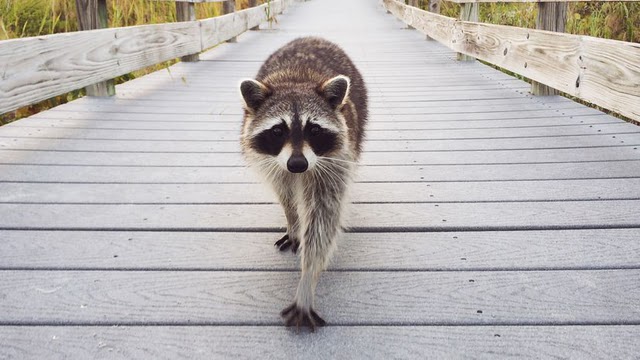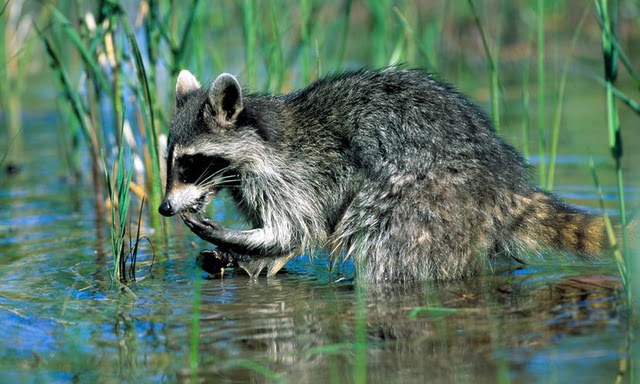Quck answer
Raccoons wash their food to increase their tactile sensitivity and remove unwanted debris. Their sensitive paws allow them to feel for any potential threats or dangerous substances on their food. Additionally, raccoons may wash their food to soften it, making it easier to eat. This behavior is also believed to be a socially learned trait, as raccoons can observe and mimic the washing behavior of their family members. Despite popular belief, raccoons do not always wash their food and may only do so when resources are abundant or competition is low.
Wild Animals

The raccoon is a notorious food thief and is known for its ability to adapt to living near humans. They are omnivorous and eat plants, small animals, and fruits. In urban areas, they can often be found scavenging in garbage cans or stealing pet food. Purdue University researchers found that raccoons were responsible for the majority of corn crop plundering in a study of wild animal behavior.
Raccoons’ forepaws are surprisingly dexterous, with each paw having five fingers that can easily grasp, hold, and manipulate objects similar to primates. Although they are not known for tool use like primates, raccoons have well-developed manual adroitness, which has been the subject of numerous studies.
One of the most puzzling traits of raccoons is their habit of washing their food near a water source. Scientists at the London Zoo studied this behavior in raccoons and found that they washed meat more often than plants but did not rinse off dirty earthworms. However, this behavior is not indicative of the raccoons intentionally cleaning their food before eating. Rather, it enhances the tactile experience involved with eating.
Raccoon Food-washing Habits: Making Mealtime a Tactile Experience

Even if no water was available, captive raccoons would move their forepaws in the same way they would if they were actually washing their food. Scientists initially believed that the raccoons lacked saliva glands and needed to add moisture to their food. However, further research has indicated that the behavior is more about enhancing the tactile experience involved with eating than cleaning the food.
Raccoons have extremely nimble forepaws that resemble human hands. They have the same nerve grouping on the hairless parts of their forepaws as primates, including humans, and are therefore very sensitive to touch. Slowly adapting nerves in the hairless patches help raccoons detect information about the weight, size, texture, and temperature of whatever they come into contact with. Researchers found that wetting the skin increases the nerve responsiveness in studies on 136 raccoons. Raccoons use a combination of sight and touch to grasp an object, often using both hands, and exhibit little independent movement of their digits. Unlike primates, raccoons lack papillary ridges, microstructures in our skin that help us detect friction and create our fingerprints. Overall, raccoons’ dexterity is specialized, but not as much as their washing behavior, which has been their distinguishing trait.
Additional Information
Related Articles from HowStuffWorks
- Bears, raccoons, and even alligators in the White House: a ridiculous history
- How good is the memory of an elephant?
- Goats love it when you smile at them
- Sloths only defecate once a week, but it’s worth the wait
Other Useful Links
- NPR: Toronto’s unstoppable “Uber-Raccoon”
References
- Burton, Maurice and Burton, Robert. “International Wildlife Encyclopedia.” Marshall Cavendish. 2001. (September 19, 2008) http://books.google.com/books?id=saySBl8hC_4C
- Callahan, Rick. “Crop Raiders: The Most Notorious Munchers.” Associated Press. LiveScience. November 5, 2004. (September 19, 2008) http://www.livescience.com/animals/crop_raiders_041105.html
- Hoffmann, Joscelyn N.; Montag, Anthony G.; and Dominy, Nathaniel J. “Meissner Corpuscles and Somatosensory Acuity: The Prehensile Appendages of Primates and Elephants.” The Anatomical Record Part A. 2004. (September 17, 2018) https://onlinelibrary.wiley.com/doi/full/10.1002/ar.a.20119
- “Iwaniuk, Andrew N. and Whishaw, Ian Q. “How skilled are the skilled movements of the raccoon (Procyon lotor)?” Behavioural Brain Research. Vol. 99, Issue 1. February 15, 1999. (September 17, 2018) https://www.sciencedirect.com/science/article/pii/S0166432898000679
- Lyall-Watson, M. “The Food ‘Washing’ Behavior of Captive Raccoons.” International Zoo Yearbook. January 1962. (September 17, 2018) https://zslpublications.onlinelibrary.wiley.com/doi/pdf/10.1111/j.1748-1090.1962.tb03382.x
- MacGowan,Brian J.; Humberg, Lee A.; Beasley, James C. and Rhodes, Olin E. Jr. “Identification of WILDlife Crop Depredation.” Department of Forestry and Natural Resources, Purdue University. (September 17, 2018) https://extension.purdue.edu/extmedia/FNR/FNR-267-W.pdf
- Pubols, Lillian M.; Pubols, Benjamin H., Jr.; and Munger, Bryce L. “Functional properties of mechanoreceptors in glabrous skin of the raccoon’s forepaw.” Experimental Neurology. Vol. 31, issue 2. May 1971. (September 17, 2018) https://www.sciencedirect.com/science/article/pii/0014488671901853
- Rasmusson, DD and Turnbull, BG. “Sensory innervation of the raccoon forepaw: 1. Receptor types in glabrous and hairy skin and deep tissue.” Somatosensory research. 1986. (September 17, 2018) https://www.ncbi.nlm.nih.gov/pubmed/3797914
- Rasmusson, DD and Turnbull, BG. “Sensory innervation of the raccoon forepaw: 2. Response properties and classification of slowly adapting fibers.” Somatosensory research. 1986. (September 17, 2018) https://www.ncbi.nlm.nih.gov/pubmed/3797915
- Zeveloff, Samuel I. “Raccoons: A Natural History.” UBC Press. 2002. (September 17, 2018) http://books.google.com/books?id=vnhVibvnzvIC
FAQ
1. What is the reason behind raccoons washing their food?
Raccoons are known for their habit of washing their food before eating it. This behavior is believed to have evolved as a survival mechanism since it allows them to remove dirt, insects, and other unwanted substances that might be present on their food. Additionally, raccoons are omnivores, and they eat a variety of foods, including fruits, meat, and insects. By washing their food, they can remove any toxins or unpleasant tastes that might be present, making it more palatable.
2. Do all raccoons wash their food?
While the majority of raccoons are known to wash their food, not all of them do. Some individuals may not have learned this behavior, while others may simply prefer to eat their food without washing it. Additionally, raccoons that live in urban environments may not have access to water sources, which can make it difficult for them to wash their food.
3. Is washing their food a learned behavior or an instinct?
Washing food is considered a learned behavior in raccoons. Young raccoons learn this behavior from their mothers, who teach them how to wash their food by example. Once they have learned this behavior, they continue to wash their food throughout their lives.
4. Can raccoons survive without washing their food?
Yes, raccoons can survive without washing their food. While washing their food can help to remove unwanted substances and make it more palatable, it is not essential for their survival. However, not washing their food can increase the risk of ingesting harmful substances, such as pesticides or bacteria, which can lead to illness or even death.
5. Do raccoons only wash their food in water?
No, raccoons can wash their food in any available water source, including streams, ponds, and even rain puddles. Some raccoons have also been observed washing their food in snow or moist soil.
6. Is there a particular time of day when raccoons wash their food?
Raccoons are nocturnal animals, and they are most active at night. Therefore, they are more likely to wash their food during the night when they are foraging for food. However, they may also wash their food during the day if they come across a food source that requires washing.
7. Can raccoons overwash their food?
While washing their food is a natural behavior for raccoons, overwashing can occur in captive individuals or in areas where water sources are scarce. Overwashing can lead to the loss of important nutrients and can make the food less palatable. However, in the wild, raccoons typically do not overwash their food.
8. Can raccoons transfer diseases through their washing behavior?
While raccoons can carry diseases, they are not known to transfer diseases through their washing behavior. However, it is important to avoid contact with raccoons and to wash your hands thoroughly if you come into contact with them or their feces to reduce the risk of contracting diseases such as rabies or leptospirosis.





Leave a Reply